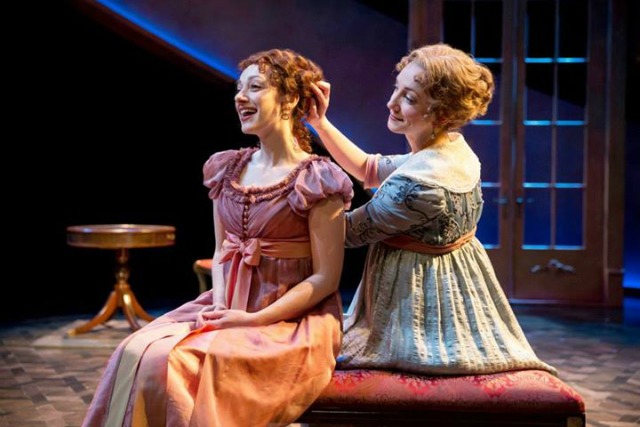INTERVIEW: Megan McGinnis And Sharon Rietkerk On 'Sense And Sensibility'
By Melody Udell in Arts & Entertainment on May 29, 2015 9:00PM

Megan McGinnis (left) and Sharon Rietkerk as Marianne and Elinor Dashwood in CST's 'Sense and Sensibility.'
It’s no surprise that the work of 18th-century English novelist Jane Austen is prime theatrical fodder. Austen’s biting social commentary, liberal use of irony, and characteristic bits of whimsy and romance are well-suited to the stage, as is the case with Chicago Shakespeare Theater’s current musical product of Sense and Sensibility, which has extended performances through Sunday, June 14.
The show, written for the stage by Paul Gordon and directed by Barbara Gaines, follows the lives of sisters Marianne and Elinor Dashwood, who must navigate family disputes, societal expectations and their love-lives despite opposing personality traits. We caught up with the show’s leads—Sharon Rietkerk as Elinor and Megan McGinnis as Marianne—to learn more about Austen’s modern-day appeal and what it's like to spend half your career in a corset.
CHICAGOIST: CST’s adaptation stays close to Jane Austen’s 1811 novel, which was written in a time in which a woman’s main achievement was to marry. In what ways do you think the show is resonating with today’s audience, and with women, in particular?
SHARON RIETKERK: I think Jane's characters translate to today's audiences because Marianne and Elinor defy the standard of their day and insist on following their hearts. They do not marry for wealth or status, but for love. Elinor falls in love with Edward not for his wealth, but because he is kind and noble and gentle. The Dashwood girls love with fierce, honest hearts. I think both men and women can relate to that.
MEGAN MCGINNIS: Actually, what I think is that it is not just women who are responding to the show. There are many people (myself included) who are fans of Austen and have read the novel countless times (and perhaps viewed the movie), who are here to celebrate this story, but there are plenty who arrive not having encountered the story and who are completely taken with it. Who can’t relate to a story about siblings who are discovering who they are? They can be different—they can fight, they can disagree—but they are family, and they will always come back to each other. There are love stories in the show, but at the heart of the story is the love between Marianne and Elinor.
C: The Dashwood sisters have very different personas; Marianne is guided by passion, and Elinor is the voice of reason. What has it been like translating both of these characters to stage? Especially Elinor, who isn’t the type to express her feelings at all, much less sing about them?
SR: It has been both joyful and challenging to find how a reserved woman like Elinor can be engaging on this stage. I have learned that just because she is demure it doesn't mean she is less passionate. I am particularly grateful that she gets to sing. While it might seem counter-intuitive to have a woman who doesn't share her feelings burst into song, it actually gives her the opportunity to reveal her emotions with the audience. Our extraordinary writer, Paul Gordon, takes advantage of the moments Elinor is alone onstage to give us a window into her soul through song. It's beautiful and moving and honest.
MM: Because Marianne is so guided by her passion (and blinded by it at times), it is incredibly fun to sing her feelings. She is just the type of person who would break out into song.
C: You both have experience playing strong women in period-piece musicals (Little Women, among them). How are you drawing from your experience to originate the roles of the Dashwood sisters?
SR: It's true, I think I have spent half of my career in a corset! Each woman and story is so different, however, that the process of creating a character starts brand new with every show.
MM: It isn’t too often that I actually play characters from modern day. Perhaps it’s the pale skin I have, or the curly hair, but I’m often cast in period plays, so leaving behind the modern vibe has never been too much of a challenge. However, I’ve never done one from this exact period, so I read up on manners from the time, and of course I read the novel several times. As far as specifically playing strong women in period pieces, it is always exciting to play someone who is a little ahead of her time. Marianne and Elinor are a wonderful contrast between “sense” and “sensibility,” which was a huge point of contention in this era. People were being drawn to the idea of “sensibility”—showing one’s feelings and not being stifled by “sense.” I had no idea this was actually happening in this time period, so it was interesting to read about.
C: This show also marks both of your debuts at CST. What’s next for each of you?
SR: Megan and I are actually doing another world premiere musical together called Triangle at TheatreWorks Silicon Valley in California, where we once again play sisters in a period piece. I feel so fortunate to have a wonderful friend and scene partner at my side two projects in a row.
MM: And after that, I will be headed back home to New York, with a project that is soon to be announced. But I’ll give you a hint: It’s another Paul Gordon show.
The show runs through Sunday, June 14 at Chicago Shakespeare Theater, 800 E. Grand Ave., 312-595-5600 or online.